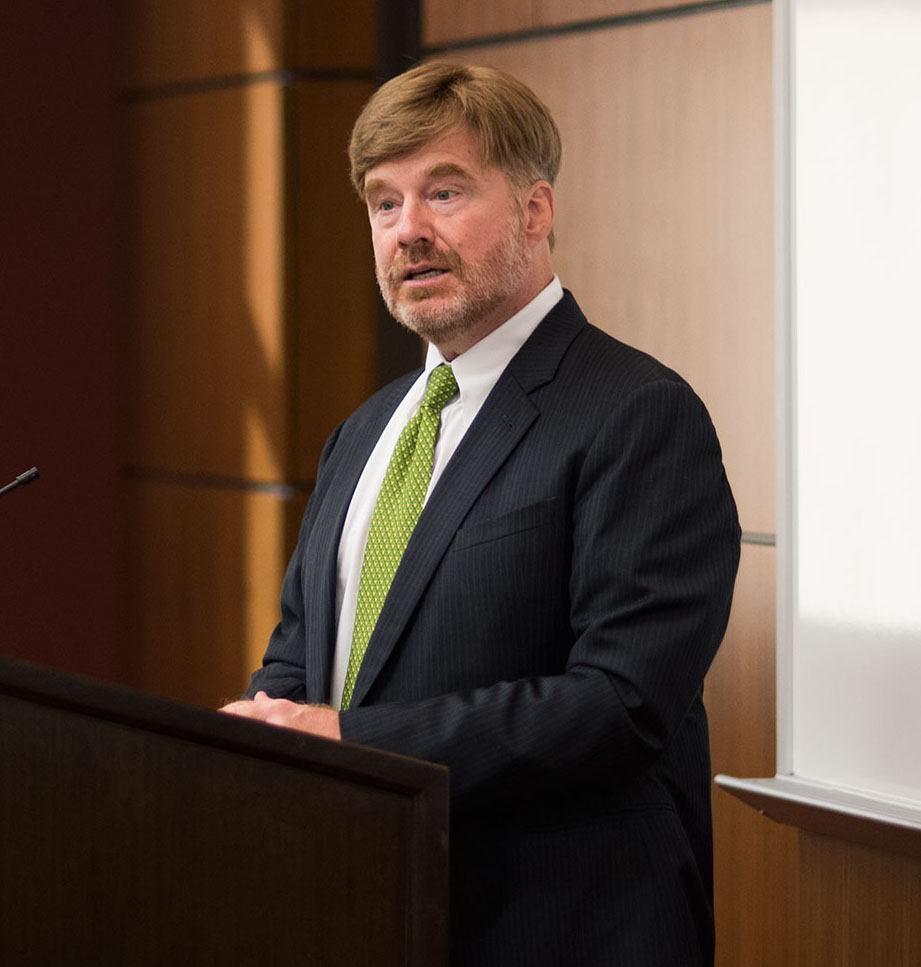David Huebner, openly LGBT former ambassador, visits USC

Persona non grata · David Huebner, the first openly LGBT ambassador confirmed by the U.S. Senate, spoke to students on campus Wednesday about the difficulties he faced as a gay diplomat in New Zealand. – Anastasia Velicescu | Daily Trojan
To begin his presentation to the International Relations Undergraduate Association and Residential Student Government on Wednesday, former United States Ambassador David Huebner gave a traditional speech in Maori, honoring the spirits who came before him and the land on which he stood.
“We are nothing without those who came before us,” Huebner said. “And in that way, I am nothing without those who came before me, and those who will come after me.”
Huebner has worked in a variety of roles, from practicing law at Arnold & Porter LLP in Los Angeles to opening his own law firm in China, along with founding the Gay & Lesbian Alliance Against Defamation. His greatest accolade came in 2009, when Huebner became the first openly LGBT person to be sworn in as an ambassador by the U.S. Senate.
This was the focus of the first half of Huebner’s talk — how social justice and public policy intersect for an openly gay U.S. diplomat. Throughout his career as an ambassador, Huebner encountered incidents of discrimination. When he was first appointed as the U.S. ambassador to New Zealand and Samoa, same-sex marriage was illegal in both countries. He was on the hit list of multiple militias. Huebner’s husband was barred from benefits typically given to spouses of U.S. diplomats and, therefore, couldn’t work as a physician when the couple lived in New Zealand. Several of the senior officers in the embassy held meetings without him, discussing their concerns that Huebner would “turn the embassy too gay.”
Huebner was not discouraged by this discrimination. Instead, he took it as a challenge and watched as the attitudes in those countries adapted through the years he worked with them.
“Being out is the single most powerful statement an LGBT person can make,” Huebner said. “If you are out and visible, social justice occurs.”
After presenting briefly for 20 minutes, Huebner opened the floor to questions from the approximately 40 students in attendance. The questions ranged from how Huebner, a leader in political social media usage, used Twitter as a diplomatic tool to how ambassadors can affect policy in the countries they work in. He spoke in depth about the impact he had in New Zealand as a communicator and an advisor.
“It’s not a diplomat’s role to make policy, but if you’re good enough at communicating, you can certainly influence policy,” Huebner said. “We don’t all think the same way. But if you listen and are willing to truly hear the needs of those who you’re working with, you will be able to find common ground.”
The event was organized by sophomore RSG Social Justice and Inclusion Coordinator Jackie Kim, who met Huebner last spring at a Pacific Council luncheon covering international policy and invited him to campus last spring. Kim felt that Huebner’s unique approach to diplomacy and his passion for reaching out to future leaders would be a perfect fit for USC students. Huebner’s talk was part of IRUA’s career month and echoed RSG’s focus on sponsoring events that support diversity and inclusivity while developing social justice across campus.
“He has experience and insight from his ‘nontraditional’ experience in the foreign service to offer to USC students,” Kim said. “Getting more exposure to USC students is something he really enjoys. He was impressed with the attentiveness and engagement of the students at the event.”
As a final question, Kim asked Huebner to share what he saw as his legacy — both as a diplomat and as an LGBT leader. But Huebner told students that their legacies should be at the back of their minds as they approach a future in diplomacy.
“Don’t go into a job worried about your legacy,” Huebner said. “I like to think about my career as being shot out of a cannon. My main fear was just don’t screw it up. Whenever you’re the first, you can’t make mistakes. But I think the thing I had was being unabashedly who I am. That, if anything, was my legacy.”
Correction: This article previously stated that Huebner began the event by speaking Samoan. He spoke Maori. The article also stated that sodomy was illegal in New Zealand and Samoa when Huebner took office. Same-sex marriage was illegal. The article has also been updated to reflect that Huebner faced incidents of discrimination, not discrimination “at every turn.” The Daily Trojan regrets the errors.
